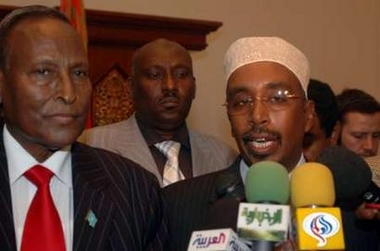 |
| Somalia's President Abdullahi Yusuf (L) and parliament speaker Sharif Hassan Sheikh Adan (R) speak to the media after signing a declaration in the southern Yemeni port city of Aden January 5, 2006. Yusuf and Adan agreed on Thursday to end a rift that has paralysed the anarchic nation, but a final declaration signed by the leaders did not mention where the government would be based. REUTERS/Khaled Abdullah |
By Mohamed Sudam
ADEN, Yemen (Reuters) - Somalia's president and parliament speaker agreed on Thursday to end a rift that has paralysed the anarchic nation, but a final declaration signed by the leaders did not say where the government would be based.
President Abdullahi Yusuf and speaker Sharif Hassan Sheikh Adan have been arguing over whether the government, now based in a northern city, should be moved to the capital Mogadishu as stipulated by a transitional national charter.
But a copy of the final declaration, signed in Yemen and obtained by Reuters, did not mention a venue for the government.
A Yemeni official close to the talks said the leaders had intentionally omitted the location of the government to avoid angering faction chiefs in Somalia.
"In principle, they agreed that the government will first move to Baidoa and then Mogadishu," the official said. Baidoa is a neutral city, while Mogadishu is considered a stronghold of a group comprising the parliament speaker, more than 100 legislators and powerful warlords in the cabinet.
Yusuf's faction set its temporary base in Jowhar, 90 km (55 miles) north of Mogadishu, saying the capital was too dangerous to be the government's seat until it was pacified.
The final declaration said both leaders had agreed to "coordination between state organisations that was based on the total respect of the ... national charter".
"Both leaders have reached an agreement to start a new page and end their differences which have brought serious damage to the ... duties of the institutions and the spirit of the Somali people," said the declaration, signed in the Yemeni city Aden.
MEDIATING TALKS
Yemeni President Ali Abdullah Saleh has been mediating talks between the two leaders as their respective factions have refused to meet on home ground.
The declaration said Yusuf and Hassan had agreed to ask parliament to meet within 30 days at a location inside Somalia that would be announced later.
"Both also called upon the members of parliament and government to put aside their fruitless squabbles and differences, urging them to unite, placing the supreme interest of the nation above other interests," it added.
Sources close to Yusuf had proposed either Baidoa or Kismayo, neutral cities in Somalia's restive south, as venues.
The fact that both factions in the government, formed in the relative safety of neighbouring Kenya in late 2004, are to meet inside Somalia at all is seen by many as major progress.
In one parliament meeting held in the Kenyan capital Nairobi before the government returned home last year, MPs threw chairs at each other, brawled and smashed the ballot box.
Tension has worsened since the two sides returned to Somalia. The factions have exchanged belligerent accusations and a U.N. report suggested they were amassing arms and moving militiamen, raising fears of yet another war in the impoverished African country.
Yusuf's administration is the 14th attempt to establish an effective central authority in Somalia since a militia coalition toppled dictator Mohamed Siad Barre in 1991 and ushered in an era of anarchy.
Source: Reuters, Jan. 05,2006

